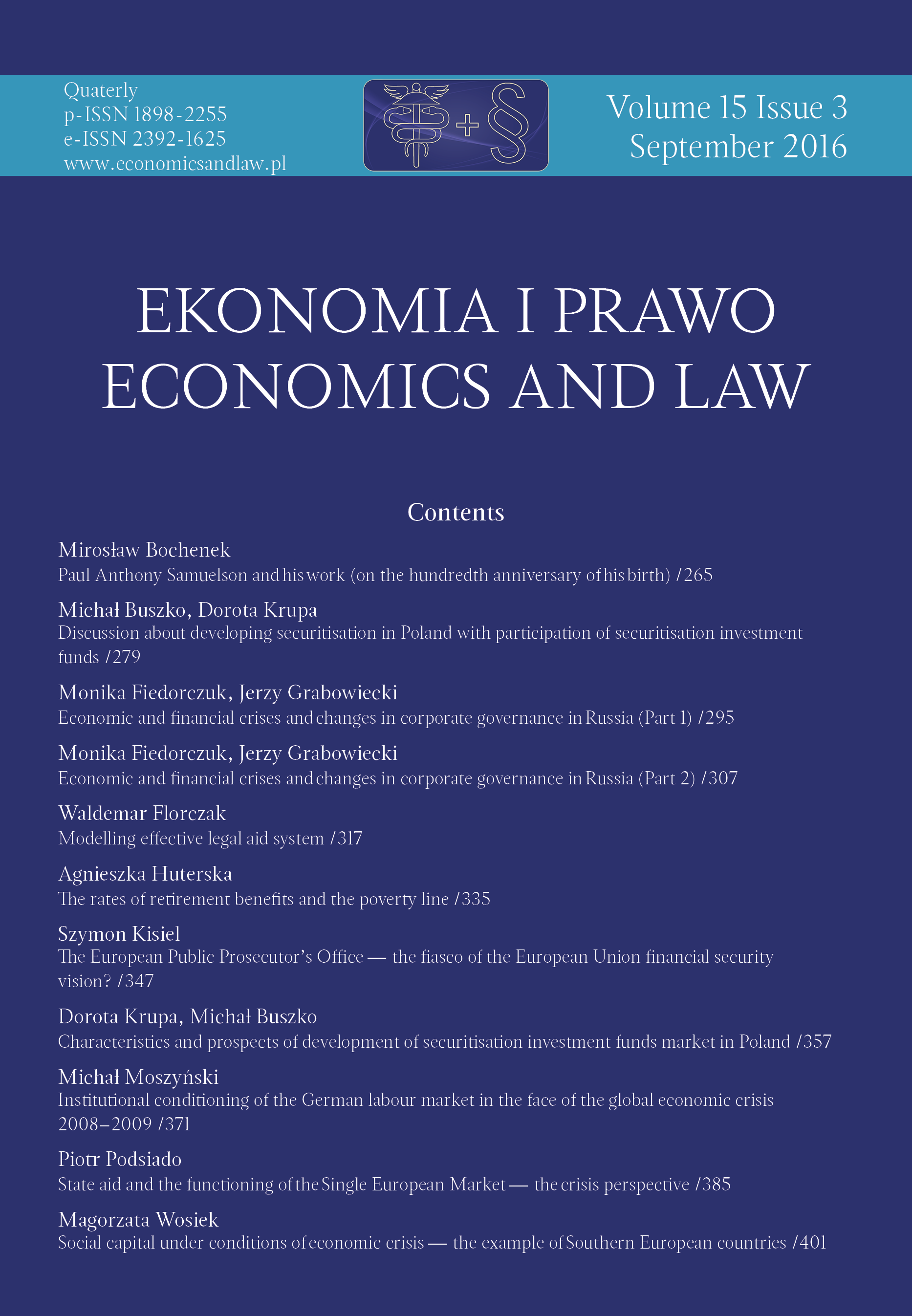Institutional conditioning of the German labour market in the face of the global economic crisis 2008–2009
DOI:
https://doi.org/10.12775/EiP.2016.025Keywords
crisis, Germany, labour market institutions, employment, unemploymentAbstract
Aim: The scientific objective of this study is an attempt to clarify the institutional aspects of the functioning of the labour market in Germany that are relevant to the response to the global economic crisis of 2008–2009.
Motivation: The reaction of German labour market was totally different than during previous recessions and the explanation of the sources of this response constitutes the main motivation to undertake this study. The considerations rely on the thesis that it could be attributed to the institutional infrastructure combined with clever economic policy of the state and responsible behaviour of social partners. The economic theory suggests how an isolated institution functions, but in the real world they works in the whole institutional network. Therefore the broader context and some linkages are mentioned.
Results: After a brief review of the main macroeconomic indicators and selected labour market institutions in Germany in comparison to the OECD countries, the labour market reforms undertaken in the period between 2002 and 2007 will be discussed. Then, selected on the basis of literature studies, institutional buffers of the labour market mitigating shocks are examined with particular emphasis on the instruments of internal flexibility, social partners’ behaviour and institutional connections of labour markets with other domains of economic order. The elements of institutional framework are subject to qualitative analysis backed up by available official statistical data.
References
Arent, S., & Nagl, W. (2001). Unemployment Benefit and Wages: The Impact of the Labor Market Reform in Germany on (Reservation) Wages. Ifo Working Paper, 101.
Balcerzak, A.P. (2009a). Wpływ działalności regulacyjnej państwa w obszarze kreowania ładu konkurencyjnego na rozwój nowej gospodarki. In A.P. Balcerzak, & M. Moszyński (Eds.). Aktywność regulacyjna państwa a potencjał rozwojowy gospodarki. Toruń: Polskie Towarzystwo Ekonomiczne Oddział w Toruniu.
Balcerzak, A.P. (Ed.). (2009b). Polski rynek pracy w warunkach integracji europejskiej. Toruń: Wydawnictwo Adam Marszałek.
Balcerzak, A.P., & Rogalska, E. (2009). Effectiveness of Polish Labour Market: Taxonometric Analysis of European Union Countries in the Years 2004–2007. Research Papers of Wrocław University of Economics — Global Challenges and Policies of the European Union — Consequences for the ‘New Member States’, 59.
Blanchard, O., & Wolfers, J. (2000). The role of shocks and institutions in the rise of European unemployment: the aggregate evidence. The Economic Journal, 110(462). doi:10.1111/1468-0297.00518.
Boeri, T., & Brücker, H. (2011). Short-time work benefits revisited: some lessons from the Great Recession. Economic Policy, 26(68). doi:10.1111/j.1468-0327.2011.271.x.
Burda, M.C., & Hunt, J. (2011). What Explains the German Labour Market, Miracle in the Great Recession? Brookings Papers on Economic Activity, 1.
Daly, M.C., Fernald, J., Jorda, O., & Nechio F. (2013). Labor Markets in the Global Financial Crisis. FRBSF Economic Letter, 38.
Dustmann, C., Fitzenberger, B., Schönberg U., & Spitz-Oener A. (2014). From the Sick Man of Europe to Economic Superstar. Journal of Economic Perspectives, 28(1). doi:10.1257/jep.28.1.167.
Eurofound (2009). European Company Survey 2009. Retrieved 12.05.2014 from http://www.eurofound.europa.eu.
Herzog-Stein, A., & Seifert, H. (2010). Der Arbeitsmarkt in der Großen Rezession — Bewährte Strategien in neuen Formen. WSI Mitteilungen, 11.
Huber, B. (2009). Zukunft der Gewerkschaften — Zukunft der Arbeitsgesellschaft. In Friedrich-Ebert-Stiftung (Ed.), Zukunft der Gewerkschaften — Zukunft der Arbeitsgesellschaft. Bonn: Bonner Dialog.
Hüfner, F., & Klein, C. (2012). The German Labour Market Preparing for the Future. OECD Economics Department Working Papers, 983. doi:10.1787/5k92sn01tzzv-en.
Instituts für Arbeitsmarkt- und Berufsforschung (2010), Retrieved 12.05.2014 from www.iab.de.
Kruppe, T., & Scholz, T. (2014). Labour hoarding in Germany Employment effects of short-time work during the crises. IAB-Discussion Paper, 17.
Lesch, H. (2010). Lohnpolitik 2000 bis 2009 — Ein informelles Bündnis für Arbeit. IW-Trends, 1.
Neumann, K.T. (2010). Einsatz für die Zukunft. Handelsblatt, 12.05.2014.
Rinne, U., & Zimmermann, K.F. (2012). Another Economic Miracle? The German Labor Market and the Great Recession. IZA Journal of Labor Policy, 1(3). doi:10.1186/2193-9004-1-3.
Sachverständigenrat zur Begutachtung der gesamtwirtschaftlichen Entwicklung (2013). Jahresgutachten 2013/14, Retrieved 12.05.2014 from https://www.sachverstaendigenrat-wirtschaft.de.
Schröder, G. (2003). Regierungserklärung vor dem Deutschen Bundestag am 14. März 2003. Mut zum Frieden und Mut zur Veränderung. Bulletin der Bundesregierung, 21–1, 14.03.2003.
Zapf, I., & Herzog-Stein, A. (2011). Betriebliche Einsatzmuster von Arbeitszeitkonten während der Großen Rezession. WSI-Mitteilungen, 2.
Downloads
Published
How to Cite
Issue
Section
Stats
Number of views and downloads: 679
Number of citations: 0
